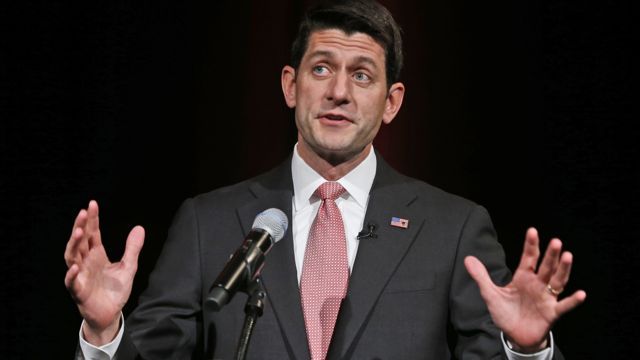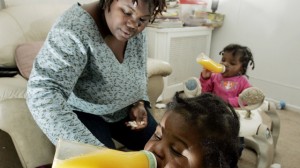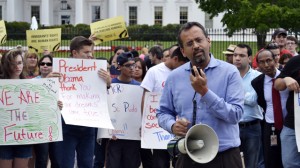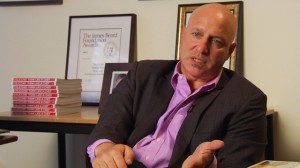
This post originally appeared at TalkPoverty.
TalkPoverty.org believes that if we are to dramatically reduce poverty in the United States we will need a strong and diverse movement that is led by people who know poverty firsthand.
Yesterday, Rep. Paul Ryan’s unveiling of his new proposal to address poverty offered the opportunity to gather responses from some of the people who might lead such a movement.
Here is what they had to say:
Tianna Gaines-Turner: About Work and People Receiving Public Assistance
Tom Colicchio: ‘Opportunity Grants’ Will Make Hunger Worse
Laffon Brelland, Jr.: ‘My Family Does Not Struggle Because We Lack Work Ethic’
Melissa Boteach: Ryan’s Case Against Himself
Peter Edelman: Compassionate Conservatism Rides Again
Anne Ford: Put Energy into Raising Wages
Deepak Bhargava: Ryan’s Poverty Plan Equals More Attacks on the Poor
Dr. Mariana Chilton: Not a Serious Dialogue
Tianna Gaines-Turner: About Work and People Receiving Public Assistance

Tianna Gaines-Turner watches as her twin toddlers Marques, left, and Marianna Turner (at the time, both only 1 year old) have juice, Feb. 26, 2009, at their home in Philadelphia, Pennsylvania. (AP Photo/Mel Evans)
Earlier this month, I had the honor of testifying at one of the War on Poverty hearings. I testified as a member of Witnesses to Hunger, and as a representative for millions of Americans like me who are struggling with poverty. I had hoped that by sharing my story, and my ideas for change, Congressman Paul Ryan would have released a poverty plan that listened a little more closely to my recommendations.
I do appreciate some of what he said in yesterday’s event at the American Enterprise Institute. I’m glad he recognizes that the government has an obligation to expand opportunities in America. Many of his ideas are good. Increasing the Earned Income Tax Credit would help a lot of struggling Americans — although paying for it by eliminating the Social Services Block Grant wouldn’t — and results-driven research is an important part of understanding what works and what doesn’t.
I did not appreciate Mr. Ryan’s comments about work and people on public assistance. He started out by saying that today’s Americans are working harder than ever before, but aren’t getting ahead. This I agree with. My husband and I both work part-time jobs, but we still struggle to make ends meet. Millions of Americans face similar situations as my husband and me.
But Mr. Ryan went on to explain that he wants to incorporate work into the safety net, like they did with welfare reform in 1996. I do not think this is a good idea. I stressed this during my testimony in front of the House Budget Committee. I explained that families are working. We don’t need to be placed in more work programs; we need our jobs to pay living wages and to offer family-oriented policies like paid sick and paid family leave. This way, we can earn more, save money and create our own safety net so that we never have to turn to the government for help again.
I am happy that Congressman Ryan ended his speech by encouraging people to send him constructive criticism, and more recommendations for him to consider when developing this poverty plan. He can be sure that I will be writing to him with more of my ideas, and more recommendations from my Witnesses to Hunger brothers and sisters.
Tianna Gaines-Turner is a member of Witnesses to Hunger, a program hosted by the Center for Hunger Free Communities at Drexel University featuring the voices and photography of parents and caregivers who have experienced hunger and poverty firsthand. She is a married mother of three children, and works with children at a local recreation facility in Northeast Philadelphia.
Tom Colicchio: ‘Opportunity Grants’ Will Make Hunger Worse
When Congressman Paul Ryan talks about consolidating means-tested programs like food stamps, child care, welfare and housing into a single grant, he’s talking about a block grant. And that’s something we already know all too much about.
The TANF block grant created in 1996 made cash assistance much harder to obtain. In 1996, about 68 percent of families with children living in poverty were able to get TANF cash assistance. Now about 25 percent can get it. Plus, the block grant is still funded at 1996 levels so cash benefits have decreased dramatically in terms of their real purchasing power.
We can’t allow the same thing to happen with food assistance.
We already have a hunger crisis in this country. Nearly 50 million people don’t necessarily know where there next meal is coming from. It’s unacceptable in the wealthiest nation in the world, and it’s a crisis virtually unknown in other wealthy nations.
But hunger is also a problem we can solve — if we look honestly and critically at the policies that contribute to either making hunger worse, or to reducing it.
Lumping nutrition assistance in with other much needed assistance — like housing and child care — would make hunger worse. For one thing, it makes it much more difficult for our growing Food Movement to hold legislators accountable for their votes on food issues. If they vote to cut the block grant is the money cut from food or housing? And if we leave it to the whims of states to decide how much nutrition assistance people can receive, or whether they can receive it at all — as with TANF — then how will we ever resolve as a nation to end hunger?
As I’ve written previously, it’s time we have a Food Movement that votes on a good fair food system for all. That same movement needs to be vigilant and speak out against bad ideas that will make our food system worse.
That means speaking out in no uncertain terms against Congressman Ryan’s proposal.
Tom Colicchio is a chef and food activist. Follow him on Twitter: @tomcolicchio.
Laffon Brelland, Jr.: ‘My Family Does Not Struggle Because We Lack Work Ethic’
Living in a single-parent household is tough. I grew up with my mother and two sisters, and although my mother always worked, we struggled to make ends meet. When the economy tanked, my mother lost her job. My older sister was in college, and even with the help from other outside family members and government assistance, we could not cover the cost of her education and all of our family’s other expenses.
I remember the day my mother looked me in the eye and said, “I’m going to be honest with you, son. With the way things are right now, I won’t be able to help you pay for college. What happens to you now is all on you.”
I took her advice and got to work. In addition to being a full-time high school honor student, I worked two low-wage jobs to help my family pay the bills. The years went on and things got harder at home. My family was always working. With my help, we were able to put my sister through college. I will be a sophomore at the University of South Carolina in the fall. But even with every able body in the house working, it is still a challenge every month to cover the bills.
My family does not struggle because we lack work ethic, which Paul Ryan’s new plan implies is the underlying cause of poverty in America. My family struggles because of poverty wages, which Ryan’s plan does nothing to rectify. Yesterday marked the fifth anniversary of the last time the federal minimum wage was raised. My family and I work tirelessly, but until employers are required to pay us enough to thrive, my families and thousands like ours will continue to scrape by.
Laffon Brelland, Jr. is a rising sophomore at the University of South Carolina, double-majoring in English and Spanish. He is a Junior Writing Fellow at the Center for Community Change.
Melissa Boteach: Ryan’s Case Against Himself
Yesterday, Rep. Ryan proposed a plan that would eliminate a program that consolidates multiple antipoverty programs into a single grant to states in the name of providing greater flexibility. Yep, you read that right.
While the press coverage has focused on Rep. Ryan’s “new” idea of consolidating multiple programs into a single “Opportunity Grant,” most of the coverage missed the fact that he proposed to pay for part of his plan by eliminating the Social Service Block Grant (SSBG).
The SSBG is a capped, flexible stream of funding to states that funds services such as adoption, child care, counseling, child abuse prevention, community-based care for seniors and people with disabilities, and employment services. Last year it helped approximately 23 million people, about half of them children. The program dates back to 1981, when a series of social services were consolidated into this single grant, and since then, many nonprofits have been funded by it to provide services like case management. Sounds a lot like Rep. Ryan’s “Opportunity Grant,” right?
Unfortunately, while SSBG provides states with enormous flexibility, over time it lost a lot of political capital. Politicians began to complain that it was duplicative of other programs. Policymakers could cut it time and again without having to cite any specific consequences since the money was “flexible.” Over time, it has lost 77 percent of its value due to inflation, cuts, and funding freezes, and in recent years, there have been attempts to eliminate it altogether. This is surely predictive of Rep. Ryan’s new proposal.
Which brings me back to the “Opportunity Grants.” Right now, Rep. Ryan is claiming that his plan is completely deficit neutral, and states would not lose any money.
Yet, in a cautionary tale, calls for elimination of SSBG have been supported by none other than Rep. Ryan, who out of the other side of his mouth is proposing an eerily similar idea: to consolidate, in the name of flexibility, major funding streams that currently help low-income families. In fact, Rep. Ryan proposes eliminating the Social Service Block Grant altogether to pay for his proposed EITC expansion for childless workers. In an ironic twist that he seems to miss, he claims that SSBG is “ineffective.”
Thank you, Paul Ryan, for illustrating more clearly than anyone else possibly could why your proposal is so dangerous.
Melissa Boteach is the Vice President of the Poverty to Prosperity Program and Half in Ten Education Fund at the Center for American Progress. Follow her on Twitter: @mboteach.
Peter Edelman: Compassionate Conservatism Rides Again
Paul Ryan has a new suit of clothes, but inside he’s still just Paul Ryan. In fact the suit of clothes is made of porcupine quills — take a close look and it’ll poke you in the eye. He’s now seeming sweet and sympathetic in wanting to do something about poverty, but what he’s proposing is mainly a shell game — now you see it, now you don’t.
Never mind that his budgets for the past four years — which would have cut $5 trillion over 10 years, with 69 percent of the cuts coming in programs for low- and moderate-income people — are still on the table. The latest Paul Ryan says he will turn well over $100 billion in federal programs into block grants once his state demonstrations prove successful. And he says he won’t cut any of the programs in his block grant. Will the real Paul Ryan please stand up?
Of course, the new and improved version of his proposals is still pretty lousy. Block grant food stamps? Terrible idea. I guess he thinks it’s fine for Mississippi to say that the definition of hunger there isn’t the same as it is in Minnesota. Make housing compete with child care by putting them both in the same block grant? Why? What we need is more investment in both.
Block grants are not the friend of low-income people. TANF, among other issues, is receiving the same $16.6 billion appropriation now as it had in 1996. The Social Services Block Grant received $2.5 billion when it was enacted in the early 70s and is now getting $1.7 billion. I guess there’s no reference to inflation in Paul Ryan’s instruction manual.
It’s time to get real. There are two huge problems (and lots of smaller ones) that are making it difficult to reduce poverty right now. One is the flood of low-work in our country — which results in 106 million people with incomes below twice the poverty line, below $39,000 for a family of three. What does Paul Ryan propose to do about that? Nothing. The other is the huge hole in our national safety net for the poorest among us — 6 million people whose total income is from food stamps, which by itself is less than about $7,000 annually for a family of three. Paul Ryan has a proposal there — put TANF, which is already almost nonexistent in most of the country, into a block grant along with food stamps, housing, child care, and God knows what else. How does he think that will go?
We tried compassionate conservatism. There was no there there then — and there still isn’t.
Peter Edelman is a professor of law at the Georgetown Law Center, and the faculty director of the Georgetown Center on Poverty and Inequality.
Anne Ford: Put Energy into Raising Wages
I’ve been a nurse for more than 30 years. I worked at DC General for 17 years and as a home health nurse for 10 years before a back surgery left me unable to care for adults. So, I switched to working with children. I’ve worked in children’s hospitals and as a school nurse and I loved it. But when I lost my job of five years, I also lost a $2,000 per month paycheck – resources I needed to care for myself and pay for my mortgage, car loan, insurance and other bills.
When I was finally able to enroll in food stamps and unemployment insurance, I received $700 per month and had to rely on my daughter’s help to make ends meet. Thankfully, I also received Medicaid, which covered my doctor’s appointments, medications and follow-up care from my surgery. Without that care I wouldn’t have been able to leave my house. I really relied on these three benefits to survive until things could get better, same as a lot of people I met in lines, filling out forms alongside me.
With his new proposal, I can see that Paul Ryan doesn’t care about us. If he did, why would he want to make getting help harder? If he had asked any person in my situation what kind of help they needed, he never would have come up with this plan. He’s never, not for one day, walked in our shoes.
Paul Ryan and I are both Christians, and I encourage him to pray on his new plan. What he’s doing is not godly. Through my church, I volunteer at So Others Might Eat (SOME), an organization that helps people who can’t make ends meet access food, clothing and health care. If Rep. Ryan’s plan goes through, the number of people needing to reach out to organizations like this will only increase, and these organizations can’t meet that kind of increased demand.
If Paul Ryan really wanted to help he should have proposed creating something, not messing up programs like food stamps that are already working well. He should have proposed to create jobs, or increase the supply of affordable housing. He should have put his energy into raising the wages at all these jobs that don’t pay enough to survive. The truth is if you don’t have a job that pays more than the cost of living, you can’t afford the necessities to live. And that’s how we ended up with all these people with nowhere to live who are fighting every minute to put food in their stomachs.
I depend on food stamps, Medicaid and unemployment insurance, but it still isn’t enough to make ends meet. But, for myself, I’m hopeful. Just this Wednesday, I accepted a full-time job as a school nurse without even asking the salary. For all those people out there who are still looking for jobs, what Paul Ryan wants to do makes me scared.
Anne Ford is a school nurse in Washington, DC.
Deepak Bhargava: Ryan’s Poverty Plan Equals More Attacks on the Poor

Deepak Bhargava speaks outside the White House after President Obama announced the Deferred Action for Childhood Arrivals program. (Photo Credit: Michael Saldarriaga)
For those of us who wish our nation’s leaders would pay more attention to the 106 million people living on the brink in this country, Paul Ryan’s new plan to address poverty is so bad it might make us think, “Careful what you wish for.”
Rep. Ryan’s plan adopts the conventional Republican analysis that individual failure and insufficient effort is the main driver of poverty, and then revives as the solution the bankrupt block grant proposals that have failed in the past.
Let’s be clear — the premise of Ryan’s argument is wrong. The evidence of our own history and from around the world shows that we can — through concerted government action — make a big difference in reducing poverty. The positive effect of better labor market standards and government supports is undeniable, in the US and around the world.
So what would a serious effort to reduce poverty look like? We could reduce poverty in the US by 80 percent by taking three simple steps:
First, we need to raise wages so that workers earn a living wage. The minimum wage must be increased to catch up with productivity growth, and workers must have the right to organize and collectively bargain for better wages.
Second, we need to eliminate racial and gender inequality in the labor market. Poverty isn’t just an economic issue; it’s a women’s rights and racial justice issue. A paycheck should be equal to the amount of work you produce, not be based on the color of your skin or your gender.
Finally, we need full employment. We need to invest in key sectors of the economy — from the green economy to infrastructure — so that we can create millions of jobs.
This strategy would reduce poverty in America by 80 percent because it would improve access to what people living in poverty really need: quality jobs that pay a decent wage. Paul Ryan’s plan, in contrast, would give people living in poverty more of what they absolutely don’t need: blame that reinforces the conditions that keep people poor. It would also lead to more hardship by further weakening our already frayed safety net.
Deepak Bhargava is the executive director of the Center for Community Change, which you can follow on Twitter: @communitychange.
Dr. Mariana Chilton: Not a Serious Dialogue
It may be surprising to hear this, but Rep. Paul Ryan is actually speaking my language.
He says he is interested in developing opportunity and choice for people, and that people need careers, not just “jobs.” He also said, loud and clear, we need to get rid of the federal red tape. In my state, the need to collect documentation of work participation hours creates such a gnarly cluster of inefficient busywork and red tape that it sucks the creativity and life out of entire communities.
When Rep. Ryan said “too many families in America are working harder and harder yet falling further behind,” I perked up, thinking — Right! Their wages have deteriorated. We should raise wages to a living wage. But discussion of wages was a glaring omission in his speech.
Another worrying thing — his talk of turning programs over to the states. There’s no good precedent for that. Consider Temporary Assistance for Needy Families (TANF), which Rep. Ryan consistently holds up as a model for reform: that’s the birthplace of federal and state red tape. Additionally, what we see on the ground with TANF is often punitive, and downright mean. Here’s an example in Pennsylvania: at a County Assistance Office, people waiting to speak to “career development workers” are actually forced to sit facing the wall with their backs to the case managers. This is dehumanizing and humiliating.
Unfortunately, that dehumanizing treatment of America’s families is what I see when I hear that Rep. Ryan is listening to his “mentors” — people who say such thoughtless, non-Christian things as “there is a deserving and undeserving poor.” Last I checked, there is no spiritual tradition, nor any political tradition, that says some people deserve to be hungry (read: poor). Since Paul Ryan comes from a state that has the highest rates of racial disparities in wealth and in health, everything he says should be held up to our public accountability meter that measures for transparency, fairness and basic humanity.
As I was listening to Rep. Ryan, I almost started thinking I could actually work with him, and that I could join the dialogue. After all, he’s the only leader recently who has shown a public attempt to make fixing poverty a focus of their leadership. But when I saw all the men (read: no women) joining him on the discussion panel at the American Enterprise Institute after his speech, I laughed out loud. Until Rep. Ryan starts including women — especially women of color, African-American, Latina, American-Indian, Asian and more — none of us can take this “dialogue” seriously.
Dr. Mariana Chilton is a nationally recognized leader addressing child hunger in America. She is an associate professor at Drexel University School of Public Health, co-principal investigator of Children’s HealthWatch and the director of the Center for Hunger-Free Communities at Drexel University School of Public Health. Follow her on Twitter: @MarianaChilton.
The views expressed in this post are the authors’ alone, and presented here to offer a variety of perspectives to our readers.


